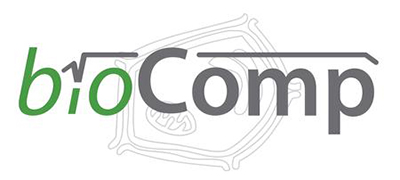Biological systems are complex systems in which the interaction of multiple molecules allows reactions to occur that eventually are the basis for life. Until now, techniques used in biology have only allowed partial insights into biological systems. Recently developed, novel technologies mainly based on nanotechnology, mass spectrometry and imaging now allow capturing the complex components and interactions of biological systems in their entirety. The resulting large datasets, however, confront biologists with new challenges, as they need to be stored in a structured manner for sustainable use and require new algorithms for their evaluation.
BioComp helps understanding biological systems in their completeness
BioComp has been founded in January 2014 as part of the Research Initiative of Rhineland-Palatinate. During BioComp's first research period (2014-2016, BioComp 1.0: Complex Data Analysis in Life Sciences and Biotechnology), many methods have been developed and applied that help understanding biological systems in their completeness.
The aim of the following two years (2017-2018, BioComp 2.0: Dynamic Membrane Processes in Biological Systems) is the investigation of dynamic processes which occur in, at, or with biomembranes. We want to understand these processes using approaches from systems biology.
The projects in BioComp aim at generating complex, quantitative data on specific biological questions, which are handled and evaluated in close collaboration with scientists from computer science and mathematics. Models resulting from such data sets again allow mathematicians to ask new questions and to develop novel mathematical methods and algorithms.
To develop and establish methods from systems biology further, BioComp is a cooperative effort of groups from
- several departments of the Rheinland-Pfälzische Technische Universität Kaiserslautern-Landau (RPTU) (Biology, Physics, Mechanical and Process Engineering, Mathematics and Computer Science)
- and our institute.

